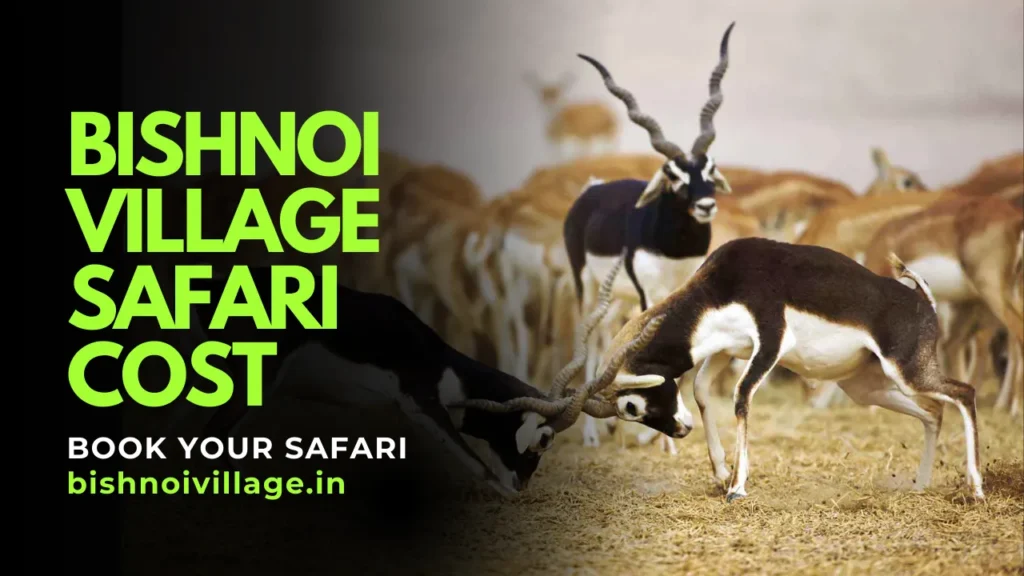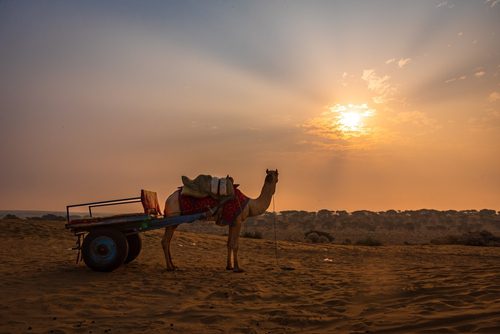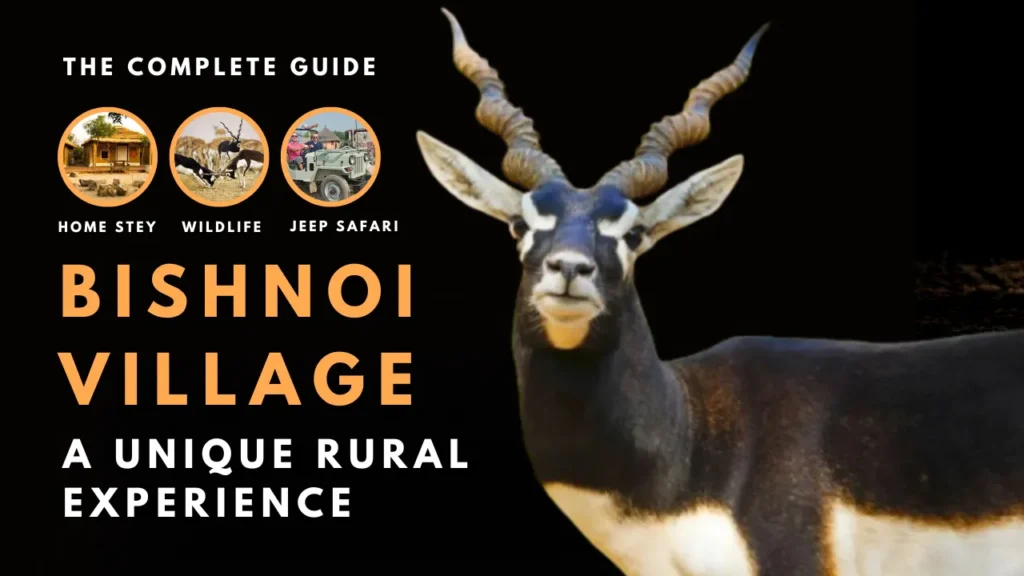Unpacking the Bishnoi Village Safari Cost: Your Authentic Guide from Jodhpur

Jodhpur, the enchanting Blue City, offers a kaleidoscope of experiences, but perhaps none are as enriching and heartwarming as a visit to the Bishnoi villages. Stepping into this world is like traveling back in time, where ancient traditions thrive, nature is revered, and community spirit reigns supreme. If you’re planning your trip to Jodhpur and dreaming of an authentic cultural immersion, you’ve likely started wondering about the “Bishnoi Village Safari cost.” At bishnoivillage.in, we believe in transparent, honest pricing that ensures you receive the best value for an unforgettable and authentic Bishnoi Village Safari from Jodhpur. Forget hidden charges and confusing itineraries – we’re here to break down exactly what goes into the Bishnoi Village tour price and why booking directly with us is your smartest choice. What Makes a Bishnoi Village Safari So Special? Before we dive into the numbers, let’s briefly paint a picture of the incredible experience that awaits. A Bishnoi Village Safari isn’t just a drive through the countryside; it’s a journey into a unique way of life. The Bishnoi community, known for their unwavering commitment to environmental conservation and animal protection, lives in harmony with nature, a philosophy deeply ingrained in their daily existence. During your safari, you’ll witness firsthand their sustainable practices, interact with local families, and gain insights into their profound respect for flora and fauna. It’s a chance to disconnect from the modern hustle and reconnect with a simpler, more profound existence. Detailed Breakdown of the Bishnoi Village Safari Cost The Bishnoi Village Safari cost can vary based on several factors, primarily the duration of your safari, the type of vehicle, and your group size. At bishnoivillage.in, we offer flexible options to cater to every traveler’s needs. Pricing Options Based on Duration & Group Size We offer both half-day and full-day safari options, each designed to provide a comprehensive and enriching experience. 1. Half-Day Bishnoi Village Safari (Approx. 4-5 hours) Perfect for those with limited time, a half-day safari offers a fantastic glimpse into Bishnoi life and nature. 2. Full-Day Bishnoi Village Safari (Approx. 8-9 hours) For a truly immersive experience, the full-day safari allows for deeper exploration and more relaxed interactions. Pricing Options Based on Type of Vehicle The most authentic and widely preferred mode of transport for a Bishnoi Village Safari is a Jeep. Please Note: All our pricing is transparent and quoted upfront. There are absolutely no hidden charges when you book with bishnoivillage.in. What’s Included in Your Bishnoi Village Safari Cost? When you book your Bishnoi Village safari booking with us, you’re investing in a comprehensive package designed for your comfort and enjoyment. Here’s what’s typically included: Optional Add-ons: Resort/Accommodation Options While our core safari packages focus on the day trip experience, for those looking to extend their stay and fully immerse themselves, we can also assist with recommendations for nearby, authentic resort or accommodation options. These would be an additional cost, but we ensure they align with the spirit of the Bishnoi experience. Why Book Your Bishnoi Village Safari Directly with bishnoivillage.in? In a world filled with third-party booking sites and agents, choosing to book directly with us offers unparalleled advantages: Frequently Asked Questions (FAQs) about Bishnoi Village Safari Cost To further clarify, here are some common questions we receive regarding the Bishnoi Village Safari cost and experience: Embark on an Unforgettable Journey with bishnoivillage.in The Bishnoi Village Safari cost is an investment in an experience that transcends mere sightseeing. It’s an opportunity to connect with a unique culture, witness the beauty of untouched nature, and create memories that will last a lifetime. At bishnoivillage.in, we are dedicated to providing you with the most authentic, valuable, and seamless Bishnoi Village Safari experience. Don’t let agents or third-party websites complicate your plans. Book directly with us and get ready to discover the heart of Rajasthan! Ready to explore the authentic soul of Rajasthan? 📞 Contact us today to learn more about our Bishnoi Village Safari options and book your unforgettable adventure directly with bishnoivillage.in!
Jodhpur to Bishnoi Village Distance: Your Ultimate Guide & Safari

Planning a trip to Jodhpur, the magnificent Blue City? While its majestic forts and vibrant markets are undeniably captivating, a truly enriching experience awaits just a short distance away: the serene and culturally rich Bishnoi Village. This detailed guide will not only answer your questions about the Jodhpur to Bishnoi Village distance but also provide everything you need to know for an unforgettable journey into the heart of rural Rajasthan. At bishnoivillage.in, we are dedicated to offering the most authentic and immersive Bishnoi Village Safari tours, connecting you directly with the community and its unparalleled eco-friendly ethos. Forget third-party bookings – your direct gateway to this incredible experience is right here! Jodhpur to Bishnoi Village Distance & Travel Time: Getting There Seamlessly One of the most frequently asked questions by travelers is the exact Bishnoi Village distance from Jodhpur. We’re here to give you all the details. Bishnoi Village is located approximately 22 kilometers southwest of Jodhpur city center. This makes it an ideal half-day or full-day excursion from Jodhpur, allowing you to easily integrate it into your itinerary. The travel time from Jodhpur to Bishnoi Village typically ranges from 30 to 45 minutes, depending on your chosen mode of transport and traffic conditions within Jodhpur. The roads connecting Jodhpur to the Bishnoi villages are generally well-maintained, ensuring a smooth and scenic drive. How to Reach Bishnoi Village from Jodhpur: Your Transportation Options Understanding your transport choices is key to planning a hassle-free trip. Here’s a breakdown of how to reach Bishnoi Village from Jodhpur: 1. By Taxi/Private Cab (Highly Recommended) 2. By Auto-Rickshaw 3. By Public Bus 4. Self-Drive (Rental Car) Bishnoi Village Safari: At a Glance Planning your visit to the unique Bishnoi Village? Here’s a quick overview of essential details to help you get started: Feature Details Location Approx. 22 km Southwest of Jodhpur City Center Travel Time from Jodhpur 30 – 45 minutes by road (taxi/cab) Best Way to Reach Private Cab/Taxi (bishnoivillage.in provides direct transport from Jodhpur) Ideal Visit Duration Half-day to Full-day Excursion Best Time to Visit October to March (Pleasant weather, ideal for wildlife spotting & cultural experiences) Key Attractions Bishnoi culture & traditions, Blackbuck & other wildlife sightings, Guda Lake (for migratory birds), Traditional crafts (pottery, weaving, block printing) Safari Type Jeep Safari in Bishnoi Village (guided tour) What’s Included (with bishnoivillage.in) Cab & transportation, Jeep Safari, Traditional Rajasthani food, Cultural interactions, Local guide services, Accommodation options (if extending stay) Special Note Experience authentic eco-tourism near Jodhpur and support the local Bishnoi community directly. Your Detailed Travel Guide for a Bishnoi Village Trip Once you’ve decided on your mode of transport, here’s a comprehensive guide to make your Bishnoi Village tour truly memorable: Best Time to Visit The ideal time to visit Bishnoi Village is during the winter months (October to March). The weather is pleasant, making outdoor activities and wildlife spotting more enjoyable. Summers (April to June) can be extremely hot, while the monsoon season (July to September) can bring humidity and affect road conditions. What to Pack Etiquette and Respect The Bishnoi community is incredibly welcoming and hospitable. To ensure a respectful interaction: What is Special About Bishnoi Village: Culture, Wildlife & Eco-Tourism A visit to Bishnoi Village is not just a sightseeing trip; it’s an immersive dive into a unique way of life. It’s a testament to how humanity can coexist harmoniously with nature. A Deep Dive into Bishnoi Culture and Traditions The Bishnoi community, followers of Guru Jambheshwar, adhere to 29 principles (Bish-noi, meaning twenty-nine) that govern their lives. These principles are deeply rooted in environmental conservation and compassion for all living beings. This commitment makes them one of the world’s first and most dedicated eco-warriors. During your Bishnoi culture tour, you’ll have the opportunity to: Wildlife Encounters: A Sanctuary in the Desert The Bishnoi community’s unwavering protection of wildlife has transformed their villages into a haven for various species. This makes eco-tourism near Jodhpur particularly vibrant here. Expect to see: The Jeep Safari in Bishnoi Village is designed specifically to maximize your chances of spotting these incredible creatures in their natural habitat while respecting their space. The Importance of the Bishnoi Community and Their Environmental Values The Bishnoi community’s legacy is profound. Their commitment to environmental preservation dates back to the 15th century and is exemplified by the famous Khejarli massacre of 1730, where 363 Bishnois sacrificed their lives to protect sacred Khejri trees from being cut down by the Maharaja’s men. This act of unparalleled courage remains a powerful symbol of their dedication to protecting nature, inspiring movements like the Chipko Movement. Their core values include: Visiting Bishnoi Village provides a rare opportunity to witness a community living these values daily, offering a powerful lesson in sustainable living and environmental stewardship. Your Ultimate Bishnoi Village Safari with BishnoiVillage.in At bishnoivillage.in, we pride ourselves on offering comprehensive and authentic Bishnoi Village Safari tours that connect you directly with the heart and soul of this remarkable community. We cut out the middlemen, ensuring you get the most genuine experience and that your contribution directly benefits the local villagers. Our tours include: Why choose bishnoivillage.in? Frequently Asked Questions (FAQs) About Bishnoi Village Here are answers to some of the most common questions about visiting Bishnoi Village from Jodhpur, designed to help you plan your trip and enhance your understanding of this unique destination. Embark on Your Unforgettable Journey The Jodhpur to Bishnoi Village distance is short, but the journey it offers is vast in its cultural and natural richness. It’s more than just a destination; it’s an education, an inspiration, and an unforgettable encounter with a community that embodies harmony with nature. Don’t miss the opportunity to experience the magic of the Bishnoi way of life. Book your Bishnoi Village Safari directly through bishnoivillage.in today and secure your spot for a truly authentic Rajasthani adventure. We look forward to welcoming you to our home!
Bishnoi Village Safari – Explore Rural Culture & Wildlife Near Jodhpur

Bishnoi Community Overview When 363 members of the Bishnoi community sacrificed their lives to protect Khejri trees (Prosopis cineraria) in 1730, they likely organized India’s first environmental movement. The Bishnoi is a religious community centered primarily in the Great Indian Desert or Thar Desert with a centuries-long legacy of practicing environmental conservation, wildlife protection, and sustainable resource management. It traces its roots of ecological consciousness and environmentalism back to the teachings of its fifteenth-century guru, Maharaja Jambheshwar, popularly known as Jambhoji. According to legend, in 1485, Saint Guru Maharaja Jambheshwar founded the Bishnoi sect of Hinduism in Marwar region of Rajasthan, India. Although the Bishnoi are today recognized as a subsect of Hinduism, they were recorded as Muslims until the 1891 Census of Marwar. While some scholars classify the Bishnoi as a liminal community because they practice both Hindu and Muslim rites, others consider them to be neither Hindu nor Muslim. The name “Bishnoi” derives from Hindi language, in which “Bish” translates to twenty and “Noi” translates to nine; it alludes to the original 29 edicts of Guru Jambhoji, which decreed how to live harmoniously with nature in the harsh climatic conditions of the Thar Desert. Notable among these edicts were the following: “do not cut green trees” and “be compassionate toward all living beings.” Jambhoji’s teachings specifically emphasized the protection of nature and wildlife because, as legend holds, earlier in his life, he had experienced severe droughts with tragic consequences for humans and animals alike. His logic was that if trees were protected, then the animals and people who depended on them would be protected in turn. Followers adhered to these principles even in times of crisis. In 1730, when Maharaja Abhay Singh, the ruler of Jodhpur, needed timber to construct the new royal palace, he sent soldiers to the Bishnoi village of Khejarli with orders to fell numerous Khejri trees—which have been sacred in Bishnoi culture. On 11 September 1730, Giridhar Bandhari, a representative of Maharaja Abhay Singh, arrived in Khejarli to fell the trees. When Amrita Devi Bishnoi, a resident of the village, was alerted to the threat, she and her daughters attempted to prevent the soldiers from cutting down the trees by hugging them while proclaiming: सर सटे रुख रहे तो भी सस्तो जान If a tree is saved even at the cost of one’s head, it is worth it. In an effort to prevent their own trees from being cut down, the nearby Bishnoi villagers followed Amrita Devi’s example and embraced the Khejri trees in the area. The soldiers ignored the residents’ pleas, and 363 Bishnoi were killed, including Amrita Devi and her daughters. When the Maharaja learned of the massacre, he immediately ordered the woodcutting operation to be halted and apologized for the deaths. He also granted complete state protection to the Bishnoi villages of the region—this is no longer applicable today, but the nonhuman nature in the area is now protected by various legislations of the Indian government. In addition, the king issued a royal decree on a copper plate, prohibiting cutting trees and hunting animals within and around all Bishnoi villages. To honor the legacy of the Bishnoi’s sacrifice, the government of India established the Amrita Devi Wildlife Protection Award (ADWPA) in 2000, and 11 September was designated National Forest Martyrs Day in 2013. Today, the Bishnoi community faces multiple environmental pressures: deforestation and biodiversity loss, depleting groundwater levels, aggressive mining activities, illegal poaching, and developmental land-grabbing. Despite these challenging conditions, the Bishnoi successfully manage their own forest in the Thar and work to maintain wild-animal populations through the use of traditional ecological knowledge and customary laws based on their religious beliefs. In line with Jambhoji’s teachings, the Bishnoi seek only to extract resources from nature as needed, as we found in a 2022–2023 primary ethnographic field survey among members of the Bishnoi community and nongovernmental organizations in Khejarli, Jajiwal, and Gharab of Jodhpur, Rajasthan. Specifically, they collect the leaves and pods of Khejri trees for vegetable and traditional medicinal uses. Besides, leaves are used as fodder for domestic animals such as goats, sheep, and camels. The Bishnoi people run community-based animal care centers to nurse injured, sick, and weak animals. Sometimes, Bishnoi women breastfeed injured fawn. Additionally, they practice community-driven monitoring systems to regulate deforestation activities and plant Khejri trees as a measure to safeguard against desertification. Further, they preserve community-managed sacred groves to protect sacred trees, sacred animals, and water; the rich biodiversity of these groves provides water in times of crisis. The harmonious relationship between the wildlife and people is visible in every Bishnoi village, with many wild animals (blackbucks, Indian gazelles, chinkaras, peacocks, great Indian bustards, partridges) freely roaming the area. The primary field survey also revealed that Bishnoi villages have significantly higher natural vegetation cover and wildlife population compared to parts of the Thar Desert, especially numbers of Khejri trees and blackbucks. The Bishnoi might not be able to influence the dominant religious and environmental discourse beyond the Thar Desert, but their doctrine preaches the virtues of environmental conservation and wildlife protection and is being passed down within the community from the older to younger generations. The Bishnoi community’s religious value-based natural-resource-management strategy significantly contributes to sustainably managing natural resources in their region. About Bishnoi Village One of the main tourist attractions in Rajasthan is the Bishnoi Village. Although 22kms from the Jodhpur city, the city houses a Hindu religious sect – the Bishnois. They get their name from Bishnoi, meaning 29, and representing the 29 principles the villagers live by. Out of these 29 principles, ten pertain to personal hygiene and good health, seven to healthy and communal social behaviour. Also four to being good devotees of God, and eight to the reservation and care towards the biosphere. The bishnoi village area is replete with wildlife! During your time in the village, you can spot ptaridges, peacocks, the endangered Great Indian Bustard, vultures, blackbuck deers, chinkaras, and many more. Much like the minority Hindu sect, the wildlife